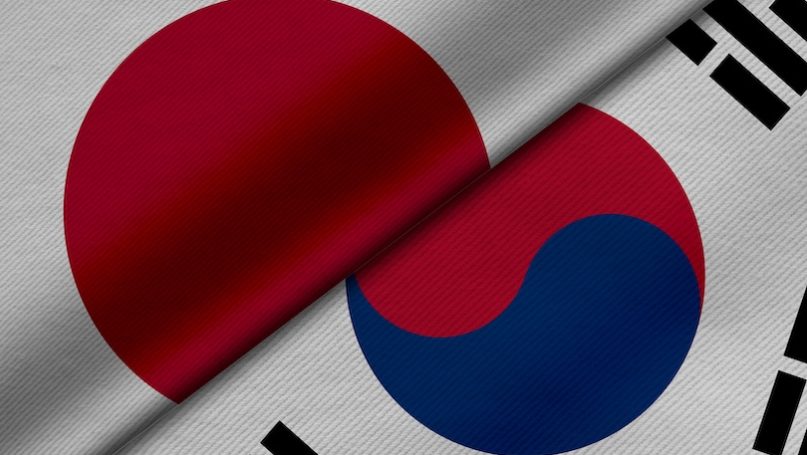
patera/shutterstock
2025 marks the 60th anniversary of the signing of the Treaty on Basic Relations between Japan and the Republic of Korea (henceforth South Korea). As this date approaches, so does the opportunity for a reflection on the bilateral relations between Tokyo and Seoul.
The end of the Asia-Pacific war did not bring a peaceful reconstruction of the regional order in East Asia. Following the Japanese occupation (1910–1945), the Korean peninsula was divided in two countries separated at the 38th parallel. This moment also marked the start of the period of authoritarian rule that characterized South Korea’s political scene until 1987. However, the democratic transition in the 1990s sparked discussions about the human rights abuses and violations experienced during the previous seventy years. As a result, several short-termed truth commissions were established with the purpose of investigating issues related to this period that included Korea under Japanese occupation, the Korean War, and the authoritarian rule. A notable example of this situation is the Truth and Reconciliation Commission of Korea, which had been relaunched in 2020.
Despite these steps in the search for a more truthful retelling of Korea’s history, the emergence of different narratives has hindered these developments. Besides the disagreements at the national level, the disputes over the historical past also influence its relations with other countries: notably, with Japan. From Tokyo’s perspective, all matters of the colonial period are to be referred to the treaties signed at the end of the war, namely the San Francisco Peace Treaty; in Seoul’s view, however, there has not been a sufficient apology nor compensation to the victims. Yet, a closer look into the relations demonstrates the complexity of the process of reconciliation.
The case of the former ‘comfort women’ exemplifies this pattern of the rise of tensions-rapprochement in bilateral relations. There were two apology statements issued by the Japanese government: the Kono Statement, in 1993, and the Murayama Statement, in 1995. Additionally, the government created the Asian Women’s Fund to compensate the victims, although the fund was supported by private donations from the Japanese society, as opposed to being financed through governmental means. This led to many survivors criticizing and rejecting the project.
In 2015, President Park Geun-hye and Prime Minister Shinzo Abe reached an Agreement that resolved the issue “finally and irreversibly”. Even though the majority of Japanese and South Koreans considered the ‘comfort women’ issue the second largest barrier to the improvement of the bilateral relations, the Agreement was received with backlash from the Korean society. Similarly to what happened in the past, there was a rejection of the Agreement due to the premise that the negotiations were conducted in secret. More importantly, without prior consultation with the victims, the final document did not “represent a victim-centered approach”, a claim which was supported by the U.N. Committee on the Elimination of All Forms of Discrimination against Women.
The resignation of Shinzo Abe – who was deeply unpopular in South Korea – and the election of Yoon Suk-yeol – who indicated an interest in pursuing stronger ties with Japan – created an opening for the establishment of talks. President Yoon’s meeting with Prime Minister Kishida prompted a rekindling of the bilateral relations, which, in time, led to the resolution of the trade dispute that had started in 2019.
This pattern of behavior has been prevalent in the bilateral relations: Korean activist groups seek reassurance from the Japanese government by asking for a clear acknowledgement of the past; Japanese politicians (e.g. Shinzo Abe) promote narratives that contradict the official government statements (e.g. visits to Yasukuni shrine; statements denying Japan’s role in the establishment of the sexual slavery system). In turn, Korea’s criticism/anger is regarded by the Japanese as an annoying insistence on the past and an avoidance of a “future-oriented” approach – which has been a key topic in the bilateral discussions for years. In the end, this cycle escalates the tensions between the two countries, until a more pressing issue appears and momentarily shifts the attention. Still, considering the overall picture hitherto described, it seems that the bilateral relations are doomed to repeat this pattern. Nevertheless, this deterministic prediction should not bind Japan-South Korea relations.
Hence, let us look at the relations from another perspective: are the historical disputes a structural issue or can single agents help break the cycle? On one hand, civil society plays a central role in this case study. The ‘comfort women’ issue perfectly exemplifies the importance of non-governmental agents in international relations. Not only have the victims and related organizations raised awareness of the issue, but at times they have done so without support from their government. On the other hand, the existing institutional arrangements also fuel potential disputes. More specifically, the San Francisco Peace Treaty, the Treaty on Basic Relations, and the 2015 Agreement, constitute the basis of the Japan-South Korea relations, shaping and limiting its interactions. A single actor can cause great damage to the bilateral relations; but his behavior is also limited by the institutional apparatus in place. In a period of rise of nationalist narratives that neglect the past doings of the Japanese empire, the actions of key actors – such as government officials – contribute to a crystallization of these ideas in society. The resultant rise in tensions makes it even harder to contradict said narratives and to search for alternative paths.
In this sense, as hostilities and tensions continue to rise in the East Asian region, I would argue that there should be more peace-oriented approaches. As Japan and South Korea share similar values, they would benefit from strengthening bilateral ties. This does not mean, however, that the historical issues should be relegated to a secondary role. Instead, a long-term vision to the bilateral relations must include a comprehensive reflection on the history of East Asia, including the actions of the Japanese empire on the Korean Peninsula and in other countries. This could be done through a cooperative effort of the several governments, in addition to the civil society organizations, and the victims. In practice, this could translate into initiatives in museums, schools, universities, social media platforms, that show a more accurate telling of history. The more awareness these issues get the easier it will be to fight the growing revisionist movement that erases the experiences of the victims. Arguably, the inclusion of the victims in the search for a solution to the historical issues is the most determinant factor to achieve a truthful resolution of the disputes.
Further Reading on E-International Relations
About The Author(s)
Sofia Ribeiro-Lemos is a PhD candidate in Political Science and International Relations at the University of Minho. Her research focuses on the Japan-South Korea relations and on USA’s role in the East Asian region. Her work has been published in Contemporary Politics.
Editorial Credit(s)
Yatana Yamahata
Before you download your free e-book, please consider donating to support open access publishing.
E-IR is an independent non-profit publisher run by an all volunteer team. Your donations allow us to invest in new open access titles and pay our bandwidth bills to ensure we keep our existing titles free to view. Any amount, in any currency, is appreciated. Many thanks!
Donations are voluntary and not required to download the e-book - your link to download is below.

 Movie
Movie 2 months ago
32
2 months ago
32 





![Presidents Day Weekend Car Sales [2021 Edition] Presidents Day Weekend Car Sales [2021 Edition]](https://www.findthebestcarprice.com/wp-content/uploads/Presidents-Day-Weekend-car-sales.jpg)



 English (United States)
English (United States)